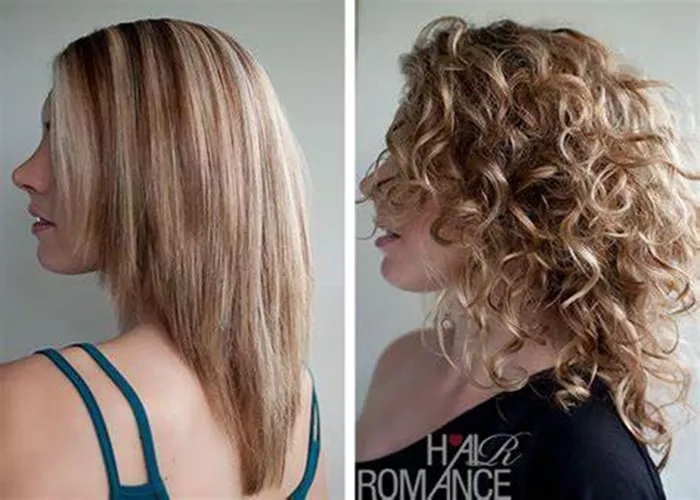Curly hair naturally forms spiral or zigzag patterns due to its oval-shaped follicle structure and uneven keratin distribution. This unique texture makes it more prone to dryness and frizz compared to straight hair types. Traditional heat styling breaks hydrogen bonds in the hair shaft to temporarily alter its shape, but repeated use damages the cuticle layer. Heat-free methods work by gradually reshaping hair through mechanical tension and chemical-free products while preserving moisture balance.
Preparation: The Foundation of Successful Straightening
Begin with freshly washed hair using a sulfate-free clarifying shampoo to remove product buildup. Apply a deep conditioning mask containing shea butter or argan oil for 20 minutes under a plastic shower cap. This moisture infusion prevents breakage during styling and helps hair hold its straightened form longer. Detangle gently using a wide-tooth comb starting from ends, working upward to minimize stress on fragile strands.
Essential Tools
- Microfiber towel or cotton T-shirt
- 100% boar bristle brush
- Silk hair wrap or satin scarf
- Non-alcoholic styling creams
- Metal-free hair elastics
The Tension Drying Method
After blotting hair with a microfiber towel, apply a heat-protectant serum (even without heat, these products smooth cuticles). Divide hair into 6-8 sections using butterfly clips. Take one section and stretch it downward while brushing with a paddle brush. Maintain constant tension as you direct airflow from a blow dryer with nozzle attachment (use cool setting if available). Repeat until 80% dry, then switch to a round brush for final smoothing. This mimics thermal straightening without excessive heat exposure.
Overnight Straightening Techniques
The Silk Wrap System
- Apply a walnut-sized amount of anti-frizz cream through damp hair
- Brush hair straight back into a tight ponytail at crown
- Braid the ponytail in 3-4 small plaits
- Wrap entire head with silk scarf using the “African threading” method
- Sleep on a satin pillowcase
- Unravel in morning and smooth with light oil spray
Weighted Straightening
This ancient technique uses hair’s natural weight against gravity:
- Part damp hair down the middle
- Apply flaxseed gel from roots to ends
- Clip each side with 4-6 jaw clips at 1-inch intervals
- Allow to air dry completely (6-8 hours)
- Remove clips and brush through with mixed bristle brush
Chemical-Free Straightening Products that Work
Temporary Solutions
- Keratin-Infused Leave-In Conditioners: Fills porous areas of hair shaft for 2-3 days of smoothness
- Coconut Milk Sprays: Lactic acid temporarily relaxes curl pattern
- Rice Water Rinses: Amino acids strengthen hair while reducing volume
Semi-Permanent Treatments
- DIY Gelatin Mask: Mix 1 tbsp unflavored gelatin with 1/2 cup hot water and 1 tsp apple cider vinegar. Apply for 45 minutes under heat cap. Lasts 2 weeks.
- Lye-Free Relaxer Kits: Look for calcium hydroxide-based formulas applied only to new growth
Maintaining Straightened Hair
Daily Care Routine
- Sleep with hair loosely braided and covered in silk
- Use dry shampoo at roots instead of washing daily
- Refresh ends with glycerin-free moisturizing mist
- Detangle with fingers before brushing
- Avoid high humidity environments when possible
Weekly Treatments
- Protein Reconstructor: Apply hydrolyzed wheat protein treatment for 15 minutes
- Scalp Massage: Stimulate circulation with rosemary oil blends
- Cold Water Rinse: Seals cuticles after conditioning
Common Mistakes to Avoid
- Over-brushing dry hair causes static and breakage
- Using heavy oils that weigh hair down unevenly
- Tight hairstyles that create tension alopecia
- Skipping pH-balancing treatments
- Rough towel-drying that roughens cuticles
When to Consider Professional Help
Consult a licensed stylist if you experience:
- Excessive shedding (>150 hairs/day)
- Chemical damage from previous treatments
- Scalp irritation or flaking
- Desire permanent straightening options
- Unusual changes in hair texture
Conclusion
Achieving straight styles without heat requires patience and proper technique, but preserves hair’s structural integrity. By combining tension methods, moisture management, and protective styling, curly-haired individuals can safely enjoy temporary straight looks. Remember that consistent care matters more than any single technique – healthy hair naturally appears smoother and more manageable. Always prioritize gentle handling over aggressive styling, and consider embracing your natural texture between straightening sessions to maintain optimal hair health.
Related topics:
How to Turn Curly Hair Straight Permanently?
Ways to Style Hair While Growing Out Bangs
Transforming Curly Hair To Straight: Methods And Tips


